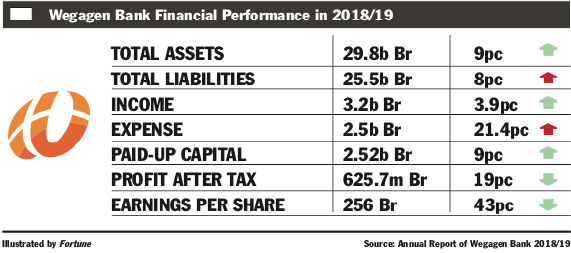
Fortune News | Feb 22,2020
Awash Insurance, which celebrated its silver jubilee, has managed to boost its net profit by 31pc to 209.8 million Br during the past fiscal year. The firm also managed to reverse the decline in shareholder return.
Two years ago, Awash's earnings per share (EPS) slipped by 17pc despite the increase in profits; however, the return for its 1,384 shareholders has registered a marginal rise in the last fiscal year by 5.3pc to 200 Br. Yet the EPS is still lower than that of two years ago, which reached 230 Br.
The decline in EPS must have been caused by the injection of massive fresh capital, according to Abdulmenan Mohammed, a financial statement analyst with close to two decades of experience.
Awash's paid-up capital increased by 24pc to 528.6 million Br. During the firm's general assembly that was held on October 28, 2020, the shareholders agreed to boost the paid-up capital further to 1.2 billion Br before the end of this fiscal year. Awash is the first firm to hold a general assembly this year.
A surge in investment income is the main factor for the improved profit performance of Awash, which was established in 1994 by 456 shareholders. Interest earned on savings increased by 24pc to 90.7 million Br, and dividends earned on investments rose by 75pc to 97.3 million Br.
Expenses of Awash have also increased in line with total income. Awash’s salaries, benefits, and administrative costs increased by 15pc to 253.8 million Br.
During the year, the firm opened one full-fledged branch at Legetafo and two contact offices at Jigjiga and Aqaqi, pushing its total physical presence to 57 locations. It also hired 62 new staff members during the year, reaching a total of 588 employees.
The growth of expenses is reasonable considering the level of inflation and business expansion, according to the expert.
Coming to the main business stream of the firm, general insurance remained more or less the same. Its underwriting surplus increased by only two percent to 277.2 million Br.
Several factors contributed to this stagnant performance, including a reduction in retention rate and a moderate increase in gross written premiums, according to Abdulmenan.
Gudissa Legesse, the CEO of the firm for the past year who replaced long-serving CEO Tsegaye Kemisi, argues that the company's positive performance hinged on the quality of its underwriting.
"During the growth in premiums," said Gudissa, "we were careful to avoid concentration of risk in certain classes of insurance."
Awash's gross premium went up by 12pc to 893 million Br. Out of this total, 27pc was ceded to reinsurers. The retention rate decreased from last year’s rate of 77pc.
Gudissa attributes the new lines of business, such as political risk insurance policies, as a cause for the reduction in Awash's retention rate. Reinsurance companies require facultative reinsurance, coverage to a single risk, for such kinds of policies, according to Gudissa.
Usually, the company buys treaty insurance from reinsurers by transferring all the risks of a specific class of policies.
"For political risks, they're going through case by case," said Gudissa, "making us cede a higher value."
Awash earned commission from reinsurers of 58.9 million Br, an increase of 10pc. The commission paid to agents went up by 12pc to 43.6 million Br. The commission paid represents 4.9pc of gross written premium, which is the same as last year’s figure.
Claims paid and other provisions careened upward by 18pc to 380 million Br.
"This increase is the main culprit for stagnant underwriting surplus," said Abdulmenan. "This calls for improved risk management."
Kebede Borena, the chairperson of the board of directors, says that the company has achieved well despite the heavy impact of a deadly pandemic (COVID-19) on business and trade for almost half of the past fiscal year.
"The result achieved can be called marvelous when weighted against the period that was full of unprecedented economic crises," he remarked.
The total assets held by Awash increased by 15pc to 2.9 billion Br. The growth rate is the same as the preceding year’s rate. Out of total assets, 772.4 million Br was invested in interest-bearing deposits, 281.8 million Br in investment properties, and 365.8 million Br in shares and bonds.
These investments accounted for 49.5pc of the total assets of Awash, the same proportion as the preceding year.
The liquidity level of Awash significantly increased. Cash and bank balances went up by 59pc to 134.3 million Br. The ratio of cash and bank balances to total assets increased to five percent from 3.4pc. Even though the liquidity level of Awash showed improvement, it was still lower than the industry average of eight percent in the 2018/19 fiscal year.
"It's very tough to comply with the stringent liquidity requirement of the National Bank of Ethiopia (NBE)," said Gudissa.
The management should ensure that the firm has adequate liquid resources for running its day to day activities, according to Abdulmenan.
The capital and reserves represent 22pc of its total assets, indicating that Awash is well-capitalised. Abdulmenan advises the management to have a capitalisation policy that enhances shareholders’ return.
However, founding shareholder Woldeyohannes Guta, is still happy with the return he received last year amounting to about 37pc after taxes and provisions.
Woldeyohannes and his 39 other friends who attended the same school in the town of Woliso in Southwest Shewa Zone of Oromia Regional State bought shares at Awash 25 years ago, hoping to retain the bond of friendship among them. The shares were owned by their not-for-profit association that was not formally registered.
However, a few years ago, they were told to transfer the shares to individuals or a legally registered company. The friends then agreed to hold raffles and transfer the shares to 10 members who will compensate those that could not win the raffle.
"I was lucky enough to be among the 10," he told Fortune.
He stayed with the insurance firm, holding 156 shares with a par value of 500 Br. A few years back, he bought an additional 20 shares through an auction, pushing his total number of shares to 176.
Woldeyohannes still believes that the firm can be even more profitable by devising different marketing strategies such as giving discounts to attract new customers.
"It's currently tapping customers that prefer to work with the company who believe in its strong hold on the industry," he said. "It can attract many more new customers."
PUBLISHED ON
Nov 07,2020 [ VOL
21 , NO
1071]

Fortune News | Feb 22,2020

Commentaries | Apr 25,2020

Fortune News | Dec 27,2018
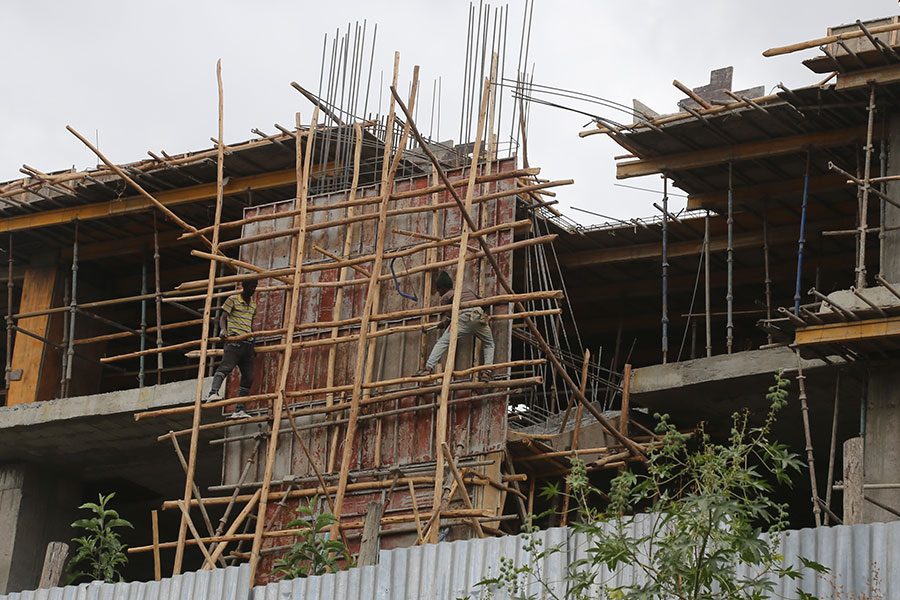
View From Arada | Apr 13,2019

Fortune News | Nov 30,2019
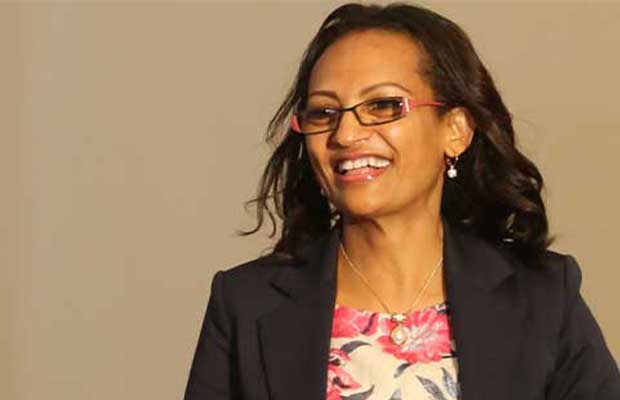
Exclusive Interviews | Jan 05,2020
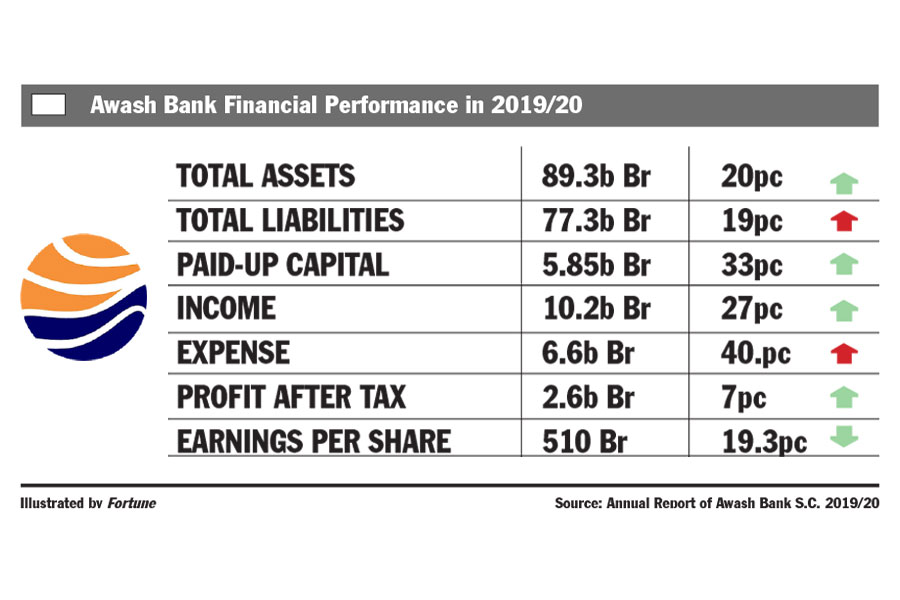
Fortune News | Dec 05,2020

Radar | Jul 17,2022

Viewpoints | Mar 20,2021
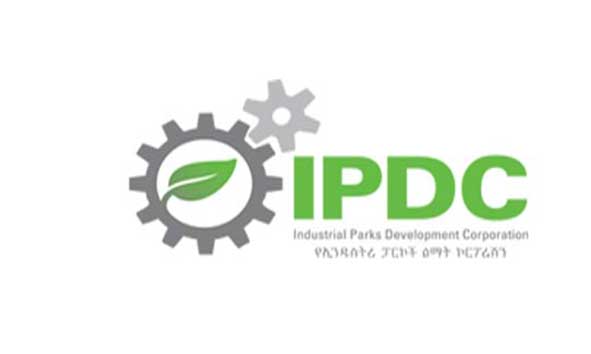
Fortune News | Aug 31,2019

Dec 22 , 2024 . By TIZITA SHEWAFERAW
Charged with transforming colossal state-owned enterprises into modern and competitiv...

Aug 18 , 2024 . By AKSAH ITALO
Although predictable Yonas Zerihun's job in the ride-hailing service is not immune to...

Jul 28 , 2024 . By TIZITA SHEWAFERAW
Unhabitual, perhaps too many, Samuel Gebreyohannes, 38, used to occasionally enjoy a couple of beers at breakfast. However, he recently swit...

Jul 13 , 2024 . By AKSAH ITALO
Investors who rely on tractors, trucks, and field vehicles for commuting, transporting commodities, and f...

Oct 25 , 2025
The regulatory machinery is on overdrive. In only two years, no fewer than 35 new pro...

Oct 18 , 2025
The political establishment, notably the ruling party and its top brass, has become p...

Oct 11 , 2025
Ladislas Farago, a roving Associated Press (AP) correspondent, arrived in Ethiopia in...

Oct 4 , 2025
Eyob Tekalegn (PhD) had been in the Governor's chair for only weeks when, on Septembe...